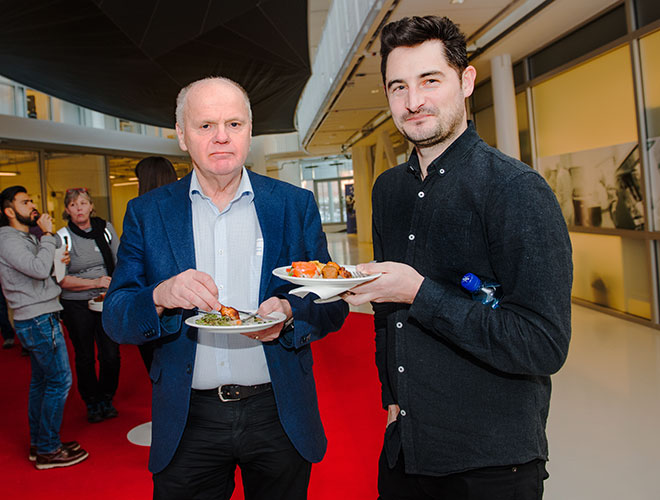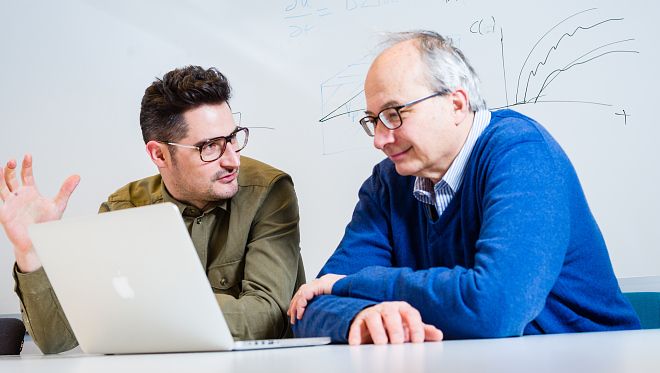Alvaro Köhn-Luque is a member of the Center for Research-based Innovation (SFI) Big Insight and has been a postdoctoral fellow at the EU-CoFound programme Scientia Fellows for one year.
Köhn-Luque works in the Department of Biostatistics at the Faculty of Medicine together with his host, professor Arnoldo Frigessi.
He is also part of one of the convergence environment that recently received funding from UiO: Life Science.
Wednesday 26th of April he gave a talk about the use of mathematics and computing in biology and biomedicine at the popular Life Science lunch under the title «Mathematical and computational modeling in biomedical research: What is it good for?».
We asked him tell us a bit about his Scientia Fellows-experience.
– So, tell us about your SF-projects?
– I am studying drug response in breast cancer using mathematics and computer simulations. Mathematics is a very precise language that helps to understand complex processes. Together with the current computing power, it allows simulating those processes under different hypothesis and comparing the outputs with real data.
– My goal is to run personalized computer simulations able to predict the effect of the therapy in a given patient. For that, I work together with other scientists in Oslo and abroad, including oncologists, pathologists, molecular biologists, imaging experts, computer scientists and statisticians. Our vision is that this type of personalised simulations will assist oncologists in the future to decide the most appropriate therapy, dose and schedule for each patient.
Read more interviews with candidates at the Scientia Fellows programme
– How is a typical day for you as a SF-fellow?
– Well, it depends. Due to the multidisciplinary nature of my research, the tasks I do are very different. Some days, I am writing down mathematical equations on paper. There are many days when I seat in front of the computer while listening to electronic music, and write reports, computer code or search for useful data and methods in the scientific literature.
Often, I am also discussing progress with my colleagues or visiting different hospital departments to discuss and analyze clinical data. After work, a few days in the week, I work out. Also every evening, I enjoy cooking some fresh, healthy food for a (usually late) Spanish dinner.
– Why did you choose to apply for a Scientia Fellows postdoc position?
– I was interested to work with Arnoldo Frigessi in the mentioned project. He suggested me to apply for a Scientia Fellow position, and I could not like more the idea.

– What have you learned as a SF-fellow so far?
– I am learning a lot about breast cancer. Being a mathematician, I feel privileged to work in a medicine faculty, collaborate with clinicians and experimental scientists and having access to high quality experimental and clinical data. Moreover, as most of my colleagues in Professor Frigessi’s group are statisticians and expert data analysts, I am starting to understand advanced statistical methods. Some of those techniques are very useful to quantify the uncertainty of my models and to integrate more and more complex data.
– What do you think your colleges have learned from you?
– My background and skills are very different from those of my colleges, so we can learn from each other all the time. I think I brought to the Faculty of Medicine experience in mathematical modeling and simulation of complex processes in biology. I also hope my colleges appreciate my views on open science and collaboration, including the use of social media for research communication.
– How does participating in Scientia Fellows benefit postdoctoral candidates?
– The working conditions are perfect to focus in research with minimal other distractions. Moreover, we have access to a fantastic postdoctoral program for career development. There, you can learn skills that are not normally explained in academia. For instance, how to successfully write grant proposals to fund your research, how to supervise younger scientists, or how to translate basic research into commercial applications.
– To whom would you recommend a Scientia Fellows postdoc position?
– I recommend it to everyone with interest in the topics offered by the hosts. The academic environment at the University of Oslo is of very high level and I see potential for developing a successful scientific career in order to become a senior scientist. Last but not least, Oslo is a great city to live in, Norway is an impressive country to explore and Norwegians are fantastic people.

